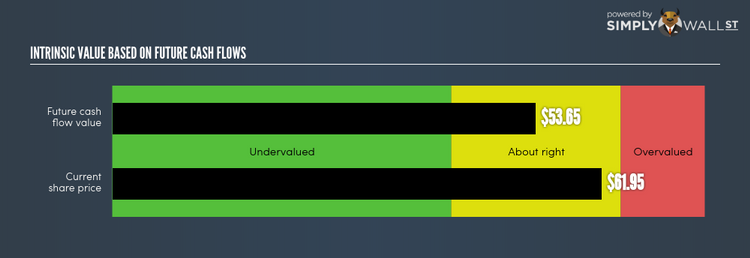Calculating The Intrinsic Value Of Big Lots Inc (NYSE:BIG)

I am going to run you through how I calculated the intrinsic value of Big Lots Inc (NYSE:BIG) using the discounted cash flow (DCF) method. Anyone interested in learning a bit more about intrinsic value should have a read of the Simply Wall St analysis model. Also note that this article was written in February 2018 so be sure check the latest calculation for Big Lots here.
What’s the value?
I will be using the 2-stage growth model, which takes into account the initial higher growth stage of a company’s life cycle and the steadier growth phase over the long run. Firstly, I use the analyst consensus estimates of BIG’s levered free cash flow (FCF) over the next five years and discounted these figures at the rate of 8.49%. When estimates weren’t available, I’ve extrapolated the average annual growth rate over the previous five years, capped at a reasonable level. This resulted in a present value of 5-year cash flow of $585.7M. Keen to know how I calculated this value? Check out our detailed analysis here.
Above is a visual representation of how BIG’s earnings are expected to move in the future, which should give you an idea of BIG’s outlook. Then, I determine the terminal value, which is the business’s cash flow after the first stage. It’s appropriate to use the 10-year government bond rate of 2.8% as the steady growth rate, which is rightly below GDP growth, but more towards the conservative side. Discounting the terminal value back five years gives us a present value of $1,669.3M.
The total value, or equity value, is then the sum of the present value of the cash flows, which in this case is $2,255.0M. In the final step we divide the equity value by the number of shares outstanding. This results in an intrinsic value of $53.65, which, compared to the current share price of $61.95, we see that Big Lots is fair value, maybe slightly overvalued at the time of writing.
Next Steps:
Valuation is only one side of the coin in terms of building your investment thesis, and it shouldn’t be the only metric you look at when researching a company.
For BIG, I’ve put together three pertinent factors you should look at:
1. Financial Health: Does BIG have a healthy balance sheet? Take a look at our free balance sheet analysis with six simple checks on key factors like leverage and risk.
2. Future Earnings: How does BIG’s growth rate compare to its peers and the wider market? Dig deeper into the analyst consensus number for the upcoming years by interacting with our free analyst growth expectation chart.
2. Other High Quality Alternatives: Are there other high quality stocks you could be holding instead of BIG? Explore our interactive list of high quality stocks to get an idea of what else is out there you may be missing!
PS. The Simply Wall St app conducts a discounted cash flow for every stock on the NYSE every 6 hours. If you want to find the calculation for other stocks just search here.
To help readers see pass the short term volatility of the financial market, we aim to bring you a long-term focused research analysis purely driven by fundamental data. Note that our analysis does not factor in the latest price sensitive company announcements.
The author is an independent contributor and at the time of publication had no position in the stocks mentioned.

